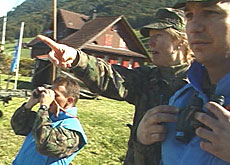
UN military observers dice with death

The normally peaceful central Swiss mountain town of Stans has been transformed into a make-believe war zone to train soldiers to become United Nations military observers.
The gruelling course teaches students everything from peace mediation to survival skills for some of the world’s most hostile areas.
On a hilltop overlooking an aircraft factory and an airstrip, students observe troop movements, weapons shipments and fighter jet sorties across an imaginary ceasefire line.
Their brief is to record what they see and to report back to command base.
Unbeknown to the 17 students, a remote-controlled drone high above their heads films their every move.
Major Christophe de Courten – who worked as a UN Military Observer (UNMO) in the former Yugoslavia – is one of the supervisors. He says the programme is designed to provide a taste of what would-be observers can expect.
“In this scenario, events occur every 30 minutes,” de Courten told swissinfo. “In the Golan Heights, this number of incidents occurs over a period of about six months.”
This is just one of many simulation field exercises to test the skills and reactions of the students. They also face being dragged through the mud in kidnapping incidents, and can expect hostile questioning at armed checkpoints.
The job of the Blue Berets – as the MOs are known – is to oversee the maintenance of ceasefire agreements, implement peace accords, mediate between warring parties and prevent the spread of conflicts.
Despite being unarmed, they are frequently victims of aggression.
In the classroom
Meanwhile, back at the army barracks, another group of students is learning resuscitation techniques using plastic dummies.
MOs are often required to work in remote areas where the health infrastructure has been destroyed, so they have to be proficient in basic first aid and life-saving procedures.
The wide-ranging curriculum on this annual UNMO residential course includes lessons in patrolling, investigating, negotiation, driving and vehicle maintenance, radio communications, mine awareness and personal survival skills.
During the intensive three-week course, students must also become proficient in English and humanitarian law.
MOs report back to the UN Secretary General in New York, and their findings form the basis of UN Security Council decisions.
Swiss assets
An MO posting is seen as a good career move for international professional soldiers. Fifteen of them are enrolled on the course in Stans, which they automatically pass.
The 17 Swiss volunteers, on the other hand, are part-time officers from a conscripted army. They are continuously assessed by their tutors, and can be failed if they do not come up to scratch.
They do not have as much field experience as their international counterparts, but bring with them useful civilian skills.
“The Swiss have all kinds of assets that a professional infantry officer might not have,” says course tutor Roy Thomas, who has served in seven different UN mission areas.
“They have good language and radio skills and are good drivers.”
Their other advantage, Thomas believes, is that the Swiss are not rank-obsessed.
“The Swiss are not afraid to speak up and make sure the right things go in the report whereas many career officers don’t feel free to speak their minds.”
Dicing with danger
Blue Berets expose themselves to huge dangers and have to spend one year in inhospitable conditions. In May, two UNMOs were killed during their mission in the Democratic Republic of Congo.
So where is the incentive to join?
“We Swiss are neutral and it’s a good way of supporting other countries,” Major Alam Alexis, an IT consultant, told swissinfo.
Former UNMO to Georgia, Major Dominik Knill, adds: “We all have the same goal – achieving lasting peace.”
Colonel Christoph Brun, head of the Stans training school, says students’ postings depend on their skills and personalities.
Deployment can take place within two to 12 months after initial training.
But Major Knill insists that training alone is not enough to make a good military observer, “MOs should not be Rambos. They need maturity and self-confidence – something you pick up over the years.
“MOs need to be able to communicate and negotiate, and this is something for which you can never get enough training.”
swissinfo, Julie Hunt in Stans
June 2003: Two military observers abducted in the Democratic Republic of Congo.
June 2003: Four UN staff kidnapped in the disputed Abkhazia region in Georgia. The UN refused to pay the ransom and the observers were freed a week later.
May 2003: Two observers from the Congo mission “savagely killed”.
April 2002: UNMOs attacked with rifle butts by Hizbollah in south Lebanon.
There are currently 20 Swiss army officers deployed as UNMOs in Georgia, the Democratic Republic of Congo and in Ethiopia/Eritrea.
A new group of observers is now being trained to take their place.
The three-week course includes lessons in patrolling, negotiation, mine awareness, humanitarian law and personal survival skills.

In compliance with the JTI standards
More: SWI swissinfo.ch certified by the Journalism Trust Initiative


























You can find an overview of ongoing debates with our journalists here . Please join us!
If you want to start a conversation about a topic raised in this article or want to report factual errors, email us at english@swissinfo.ch.